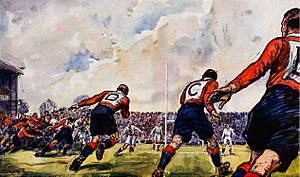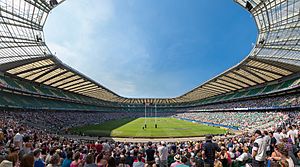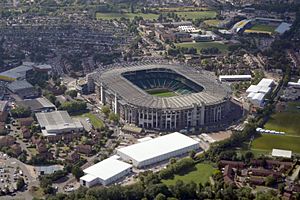Twickenham Stadium facts for kids
|
Billy Williams' Cabbage Patch
The Cabbage Patch Twickers Headquarters HQ |
|
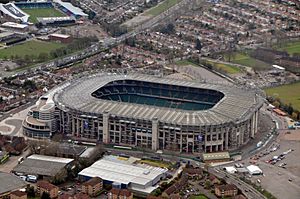
Aerial view of Twickenham Stadium in 2009
|
|
| Location | 200 Whitton Road, Twickenham, Middlesex TW2 7BA |
|---|---|
| Coordinates | 51°27′22″N 0°20′30″W / 51.45611°N 0.34167°W |
| Public transit | |
| Owner | Rugby Football Union |
| Executive suites | 150 |
| Capacity | 82,000 (rugby) 75,000 (American football) |
| Field size | 125 m x 70 m |
| Surface | Desso GrassMaster |
| Construction | |
| Built | 1907 |
| Opened | 2 October 1909 |
| Architect | John Bradley |
| Tenants | |
| England national rugby union team | |
Twickenham Stadium ( usually known as Twickenham) of Twickenham, south-western London in England, is a purpose built rugby union stadium. The Rugby Football Union (RFU), English rugby union governing body, owns and holds its headquarters at the stadium. The most notable tenant is the England national rugby union team, hosting its home test matches at the stadium.
It is the world‘s largest rugby union-specific stadium, the second largest in the United Kingdom behind Wembley Stadium, and the fourth largest in Europe.
Middlesex Sevens matches; selected Premiership Rugby fixtures; selected Anglo-Welsh Cup matches; the Varsity Match between Oxford and Cambridge universities and selected European Rugby Champions Cup rugby union games, are also played at Twickenham Stadium.
It has also been used as the venue for rugby league's Challenge Cup finals, conventions of Jehovah's Witnesses and it hosted American football as part of the NFL London Games in 2016 and 2017.
Twickenham Stadium has hosted concerts by Rihanna, Iron Maiden, Bryan Adams, Bon Jovi, Genesis, U2, Beyoncé, The Rolling Stones, The Police, Eagles, R.E.M., Eminem, and Lady Gaga.
Contents
Overview
Twickenham is often referred to as "the Home of England Rugby". The stadium, owned and operated by the RFU, hosts rugby union fixtures year round. It is the home of the English rugby union team, who play nearly all their home games at the stadium. Twickenham hosts England's home Six Nations matches, as well as inbound touring teams from the Southern Hemisphere, usually annually around November.
Apart from its relationship with the national team, Twickenham is the venue for a number of other domestic and international rugby union matches. It hosts the annual London leg of the World Rugby Sevens Series, the Cup (championship) final and third-place match of the annual London leg of the World Rugby Women's Sevens Series, and the domestic Middlesex Sevens competition. It is also the venue for the Premiership Rugby final as well as the season-opening London Double Header, Big Game and an annual fixture hosted by Bath Rugby. Anglo-Welsh Cup, Heineken Cup and Champions Cup finals have also been held here in the past. The stadium is also host to The Varsity Match between Oxford and Cambridge, the English schools' Daily Mail Cup Final and the Army Navy Match which forms the culmination of the annual Inter-Services Competition.
History
Sold out Tests against New Zealand and South Africa at Crystal Palace saw the RFU realise the benefit of owning their own ground. Committee member William Williams and treasurer William Cail led the way to purchasing a 10.25 acre (4 hectare) market garden in Twickenham in 1907 for £5,500 12s 6d. The first stands were constructed the following year. Before the ground was purchased, it was used to grow cabbages, and so Twickenham Stadium is affectionately known as the Cabbage Patch. After further expenditure on roads, the first game, between Harlequins v. Richmond, was played on 2 October 1909, and the first international, England v. Wales, on 15 January 1910. At the time of the English-Welsh game, the stadium had a maximum capacity of 20,000 spectators. During World War I the ground was used for cattle, horse and sheep grazing. King George V unveiled a war memorial in 1921.
In 1926, the first Middlesex Sevens took place at the ground. In 1927 the first Varsity Match took place at Twickenham for the first time. On 19 March 1938, BBC Television broadcast the England – Scotland (Calcutta Cup) match from Twickenham, the first time that a rugby match was shown live on television. In 1959, to mark 50 years of the ground, a combined side of England and Wales beat Ireland and Scotland by 26 points to 17.
Coming into the last match of the 1988 season England had lost 15 of their previous 23 matches in the Five Nations Championship. The Twickenham crowd had only seen one solitary England try in the previous two years, and at half-time, they were 0–3 down against the Irish. During the second half, a remarkable transformation took place and England started playing an expansive game many had doubted they were capable of producing. A 0–3 deficit was turned into a 35–3 win, with England scoring six tries. This day also saw the origins of the adoption of the traditional spiritual "Swing Low, Sweet Chariot" as a terrace song. In the 35–3 win against Ireland, three of England's tries were scored by Chris Oti, a black player who had made a reputation for himself that season as a speedster on the left wing. A group of boys from the Benedictine school Douai, following a tradition at their school games, sang "Swing Low, Sweet Chariot" whenever a try was scored. When Oti scored his second try, amused spectators standing close to the boys joined in, and when Oti scored his hat-trick the song was heard around the ground. Since then "Swing Low, Sweet Chariot" has been a song to sing at England home games, in the same way that Fields of Athenry is sung in Dublin and Cwm Rhondda is sung in Cardiff.
The United Kingdom, Ireland and France shared the hosting of the 1991 Rugby World Cup. Twickenham was used during pool A England matches. Twickenham was also host of the 1991 Rugby World Cup Final in which Australia beat England 12–6. For this game, England changed their style of play, opting for the sort of running game that had brought them victory against Ireland in the March 1988 game referred to above. During this match, with the English facing a 12–3 deficit, David Campese reached one-handed for a ball thrown to England winger, Rory Underwood. He dropped it and the ball rolled forward, gifting England a penalty that proved to be the last score of the game. Some have claimed that Campese's action should have been interpreted as a deliberate professional foul, with possible disciplinary action against the Australian player. However, on the same ground in November 1988, Campese had intercepted a similar pass and run the length of the field to score a try.
Some of the Welsh-hosted 1999 Rugby World Cup games were taken to Twickenham. These included three of England's pool B matches, the second round playoff when England defeated Fiji 45 points to 24, and both semi-finals, none of which England were involved in, having made their exit in the quarter-finals at the hands of South Africa. Under the reign of Clive Woodward, the stadium became known as 'Fortress Twickenham', as England enjoyed a run of 19 unbeaten home matches from October 1999, ending with defeat against Ireland in 2004. The IRB Rugby Aid Match was played on 5 March 2005 under the auspices of the International Rugby Board (IRB) to raise money for the United Nations World Food Programme to support its work aiding victims of the 2004 Indian Ocean tsunami. Representative sides of the Northern and Southern hemispheres played at Twickenham. The final score was Northern Hemisphere 19 – Southern Hemisphere 54.
Rugby World Cup
Twickenham Stadium has hosted Rugby World Cup Matches in 1991, 1999 and 2015 with England as hosts in 1991 and 2015 therefore holding the Final. The Stadium also hosted semi finals in 1999 including France's 43–31 victory over favourites New Zealand, regarded by many as the best Rugby match of all time.
1991 Rugby World Cup
| Stage of Tournament | Team 1 | Score | Team 2 |
|---|---|---|---|
| Pool A | England | 12–18 | New Zealand |
| Pool A | England | 36–6 | Italy |
| Pool A | England | 37–9 | United States of America |
| Final | England | 6–12 | Australia |
1999 Rugby World Cup
| Stage of Tournament | Team 1 | Score | Team 2 |
|---|---|---|---|
| Pool B | England | 67–7 | Italy |
| Pool B | England | 16–30 | New Zealand |
| Pool B | England | 101–10 | Tonga |
| Quarter Final Play Off | England | 45–24 | Fiji |
| Semi Final | Australia | 27–21 | South Africa |
| Semi Final | France | 43–31 | New Zealand |
2015 Rugby World Cup
| Stage of Tournament | Team 1 | Score | Team 2 |
|---|---|---|---|
| Pool A | England | 35–11 | Fiji |
| Pool A | England | 25–28 | Wales |
| Pool A | England | 13–33 | Australia |
| Pool A | Australia | 15–6 | Wales |
| Pool D | France | 32–10 | Italy |
| Quarter Final | South Africa | 23–19 | Wales |
| Quarter Final | Australia | 35–34 | Scotland |
| Semi Final | South Africa | 18–20 | New Zealand |
| Semi Final | Argentina | 15–29 | Australia |
| Final | New Zealand | 34–17 | Australia |
Other uses
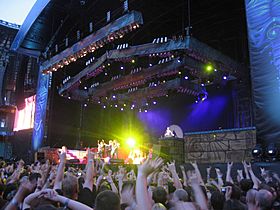
Though Twickenham usually only hosts rugby union fixtures, it has in the past been the venue for a number of other events. In 2000, the ground hosted its first game of rugby league, in which Australia defeated England in the opening game of the 2000 Rugby League World Cup. The Rugby League Challenge Cup Final has also been played at Twickenham twice, in 2001 and 2006, and was won by St. Helens on both occasions.
Due to the construction delays of Wembley, a number of scheduled events at Wembley were moved to Twickenham. The Challenge Cup and the Rolling Stones' A Bigger Bang Tour concerts were taken to Twickenham. The Stones also played two shows at Twickenham in August and September 2003, the first of which was used as their stadium concert disc for the 2003 DVD Four Flicks. During 2007 Genesis played at Twickenham during their reunion tour. The Police played at the stadium in September 2007 and Rod Stewart in June. The usual capacity for concerts is anything up to 80,000, as opposed to the 82,000 for rugby.
R.E.M. performed at Twickenham in August 2008, while New Jersey rockers Bon Jovi played two gigs at the stadium in June 2008 as part of their Lost Highway Tour, and Iron Maiden played there as part of their Somewhere Back in Time World Tour on 5 July 2008, along with a full supporting bill which included Avenged Sevenfold, Within Temptation and Lauren Harris.
Lady Gaga performed two sold-out shows at the stadium during her Born This Way Ball Tour on the 8th and 9 September 2012 with 101,250 people attending for both shows. The first date broke a record for The Fastest Selling-out Stadium Show in UK history when the 50,625 tickets for the first show sold out in 50 seconds.
Rihanna performed two shows at the stadium during her Diamonds World Tour on 15 and 16 June 2013 for 95,971 people for both nights.
Since the mid-1950s it has also hosted the Jehovah's Witnesses annual convention for the London area. Usually up to 25,000 attend to hear Bible talks.
The TV motoring show Top Gear used the pitch for a match of rugby, played using Kia cars. This was played prior to resurfacing.
Concerts
| Date | Performer(s) | Opening act(s) | Tour/Event | Attendance | Notes |
|---|---|---|---|---|---|
| 24 Aug 2003 | The Rolling Stones | Licks Tour | |||
| 20 Sept 2003 | |||||
| 18 June 2005 | U2 | Doves, Idlewild, Athlete, Ash | Vertigo Tour | 110,796 | |
| 19 June 2005 | |||||
| 17 June 2006 | Eagles | Farewell 1 Tour | |||
| 20 Aug 2006 | The Rolling Stones | Feeder | A Bigger Bang | 100,540 | |
| 22 Aug 2006 | The Charlatans | ||||
| 30 June 2007 | Rod Stewart | Greatest Hits | |||
| 8 July 2007 | Genesis | Turn It On Again: The Tour | |||
| 27 June 2008 | Bon Jovi | Biffy Clyro | Lost Highway Tour | 92,852 | |
| 28 June 2008 | The Feeling | ||||
| 5 July 2008 | Iron Maiden | Avenged Sevenfold, Within Temptation, Lauren Harris | Somewhere Back in Time World Tour | 55,000 | |
| 30 Aug 2008 | R.E.M. | Accelerate Tour | |||
| 8 Sept 2007 | The Police | Maxïmo Park, Fiction Plane | The Police Reunion Tour | 104,417 | |
| 9 Sept 2007 | |||||
| 12 Sept 2010 | Various Artists | Robbie Williams, Alexandra Burke, Bruce Forsyth, Enrique Iglesias, Jack Dee, James Blunt, Jason Manford, John Bishop, Katherine Jenkins, |
Help For Heroes Concert | ||
| 8 Sept 2012 | Lady Gaga | The Darkness, Lady Starlight | Born This Way Ball | 101,250 | |
| 9 Sept 2012 | |||||
| 1 June 2013 | Various Artists | Beyoncé, Ellie Goulding, Laura Pausini, Jennifer Lopez, Jessie J, John Legend & Timbaland, among others |
Sound for Change Live | 45,060 | |
| 15 June 2013 | Rihanna | David Guetta, GTA | Diamonds World Tour | 95,971 | |
| 16 June 2013 | |||||
| 8 July 2017 | U2 | Noel Gallagher's High Flying Birds | The Joshua Tree Tour 2017 | 108,894 | |
| 9 July 2017 | |||||
| 19 June 2018 | The Rolling Stones | James Bay | No Filter Tour | ||
| 14 July 2018 | Eminem | 2 Chainz, Royce 5'9" & Boogie | Revival Tour | ||
| 15 July 2018 | Prophets of Rage, Royce 5'9" & Boogie | ||||
| 20 June 2019 | Metallica | Ghost Bokassa |
WorldWired Tour | 51,819 |
American football
It was announced on 3 November 2015 that the RFU and America's National Football League had agreed a three-year deal to host at least three NFL London Games. The deal began in October 2016 and gave the opportunity to host an additional two games over the three-year period of the deal.
On 23 October 2016, the Los Angeles Rams hosted the New York Giants at Twickenham Stadium. This was the second of three London Games in 2016, with the others being played at Wembley. The game was televised live in the UK on BBC Two.
The final two games of the agreement were played in 2017, with matchups announced on 13 December 2016.
| List of NFL London Games at Twickenham Stadium | |||||||
|---|---|---|---|---|---|---|---|
| Year | Date | UK Broadcaster | Designated Home | Score | Designated Away | Attendance | Pre-game show |
| 2016 | 23 October | BBC | 10–17 | 74,121 | Craig David | ||
| 2017 | 22 October | Sky Sports | 33–0 | 73,736 | |||
| 29 October | BBC | 16–33 | 74,237 | ||||
World Rugby Museum
The World Rugby Union Museum is a museum located in Twickenham Stadium. The museum covers the whole of the global game, not just English rugby union. It tells the history of the sport, including William Webb Ellis and Richard Lindon, using interactive display techniques. The museum has a rolling programme of special exhibitions which cover topical issues and offer an opportunity to display some of the obscurer items in the collection. Some unique displays include an English rugby union jersey from the first ever rugby union international in 1871 between England and Scotland, and (until 2005) the William Webb Ellis Cup which was obtained by England at the 2003 Rugby World Cup. Twickenham Stadium Tours are also available through the Museum and run four times per day (Tuesday to Saturday) and twice on Sundays. It is usually open every day of the week except for Mondays. Except match days when, for ticket holders only, a special price entry to the museum is available.
See also
 In Spanish: Estadio de Twickenham para niños
In Spanish: Estadio de Twickenham para niños


